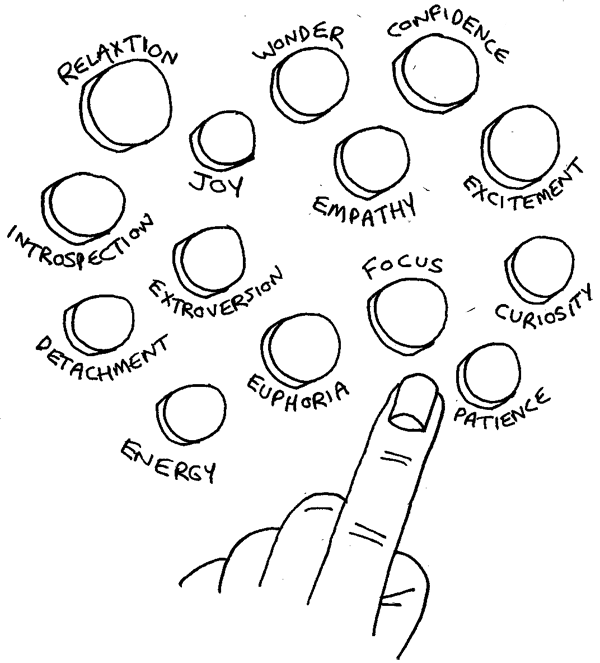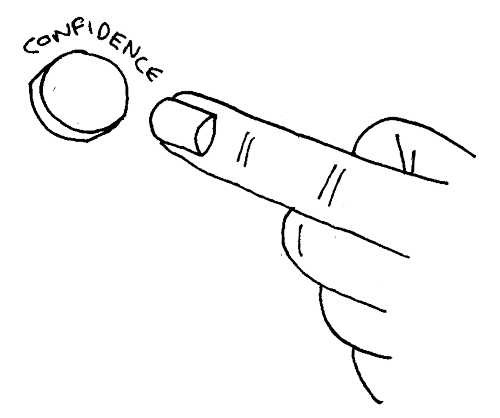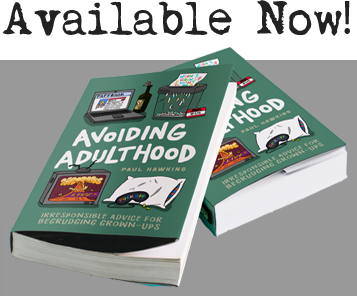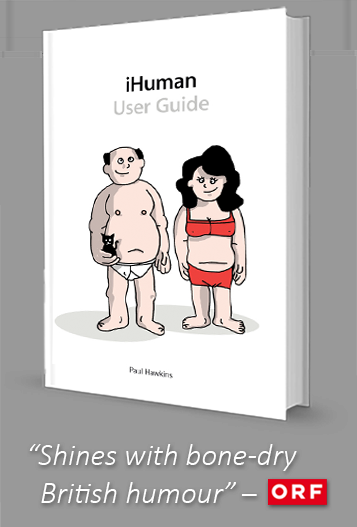
Clicking the World Away: Drugs, Addiction and the Future of Consciousness
Part I: The Remote Control
Imagine you had a remote control for your conscious experience of the world, and whenever you wanted to feel uplifted, think faster, relax more, experience joy, empathise with someone, enjoy more confidence, or be instantly less bored, all you had to do was push a button, and the desired state would reliably and instantly arrive to replace your current one. Click.
In this world, when you were sad, you would press a button. Bored? Press a button. You wouldn’t have to do laborious things like practice your speech in front of the mirror for weeks on in order to slowly build-up the native confidence to perform it in public. No, you’d press a button. You wouldn’t have to research areas of interest or pursue new hobbies for years to slowly alleviate the boredom inherent in monotonous and unproductive spare time. Nope. Just press a button. You wouldn’t have to go through a long, unwieldy session of therapy to slowly learn to fully empathise with and forgive your family, boss, or partner. How old-fashioned. Instead, why not pick up your Consciousness Remote Control, press a button, and simply change the channel of your conscious experience instantly? Click.
Here are some of the buttons I would expect any top-of-the-range Consciousness Remote Control to have:
Well, luckily we don’t have to work too hard to imagine a Consciousness Remote Control, because we already live in a world where almost precisely such a remote control exists.
We call them drugs.
The Remote Control
Saying positive things about ‘drugs’ is risky. It’s a baggage-laden collective noun for good reason, and it’s not hard to see why slightly more hysterical people might get emotional when discussing an umbrella term for things as diverse in their effects as coffee and LSD, beer and barbiturates, cigarettes and crack cocaine, magic mushrooms and morphine. However, there’s one predominant quality of all ‘drugs’ that is not at all controversial: drugs consist of stuff – powders, liquids, crystals, gases, beans, leaves, cacti, fungi, rotting fruit – that contain chemical compounds (look for the scrabble letters LSD, THC, DMT, MDMA, etc.), which can be absorbed by our mammalian bodies, whoosh through our bloodstreams, nip across the blood-brain barrier, and plug into receptors in our brains, that are – rather remarkably – exactly the right shape to take them. Then something pretty weird happens.
They change the experience of whatever part of life is currently screening in the theater of our consciousness.
CLICK.
Drugs are, quite literally, mind-altering substances. They are psychoactive catalysts (or gateways) to different states of consciousness – many of them so decidedly interesting, pleasant, uplifting, helpful or just generally appealing to try out that ‘we’ (society/voters/the government/whatever) make most of them illegal, so democratically afraid are we of dependency, addiction, and the other risks we perceive to civilisation of too many people having too nice a time on their own, instead of doing all the other things they’re supposed to. Comedian Louis C.K. put it this way:
I don’t know how I’m going to tell my kids [about drugs] … How do you take a miserable person with no control over their lives, and tell them with a straight face: ‘you can’t do drugs … You can’t do it, baby… All drugs are are a perfect solution to every problem you have right now.’ How do you beat that?! Drugs are so fucking good… that they will ruin your life! That’s how good they are!
Think about it this way: your waking life feels like an experience (rather than a something which is having an experience), because you only experience life from one perspective – a kind of ‘headless’ vantage point as the consciousness ‘you’ are. Hopefully, it’s a mostly good experience. If ‘you’ are indistinguishable from your thoughts, feelings, and experiences funneling through your head, then what drugs are actually doing is temporarily changing who you are. (This should be our first clue as to why some people crave them, some people can easily dip in and out, and some people are terrified, perhaps rightly, to never go near them.)
In terms of the absolutely reliable consciousness changes that drugs bring about, drug dabblers, drug aficionados and drug addicts will find it increasingly easy to pair up many of the desired states listed on the Consciousness Remote Control with their corresponding chemical partners. Some of these conscious states are relatively mundane and familiar (drunk, over-caffeinated), some of them are harder to define (high, stoned), and some of them sit so far outside the parameters of normal conscious experience, they feel less like you’re changing the channel of your experience, and more like you’re downloading an IMAX experience onto your wind-up radio (tripping.)
For our purposes, however, we will work with the most commonly-used drug on the planet, because it is the one that the majority of readers are most likely to be familiar with: the chemical C2H6O, a.k.a. the active chemical compound in fermented organic sludge water, a.k.a. the selection of popular liquids more lovingly known as booze.
If you’re feeling shy at a party, or worried on a first date, or struggling to make conversation at an awkward family dinner, what you might be looking for is this button:
(Can’t find it? It might also be labelled extroversion, bravado, lowered inhibition, or reduced self-consciousness.) Luckily, the button is there on most of our Consciousness Remote Controls, labelled beer or gin or whiskey, and you can press it from basically anywhere you want in our modern world of near omnipotent booze-access — from shops to airplanes, from hotel mini-bars to almost every public building that you’re expected to spend more than an hour in. Click, click, glug, glug.
Your increasingly confident State of Consciousness is on its way!
Addiction
“OK,” you say, “great! Finally, the solution to all life’s annoying problems! Let’s all do all drugs all the time!”
Ah. Well, this is awkward. You see, there’s a second way to imagine our Consciousness Remote Control.
Firstly, let’s just take those buttons off. Instead of the State of Consciousness we want to come, we can now see the State of Consciousness we want to get rid of. OK. Now the holes represent the baseline ‘problem’ we are actually trying to solve by using the drug in the first place. Here’s our exact same Consciousness Remote Control, except now the device looks about as much fun as Morrissey’s to-do list:
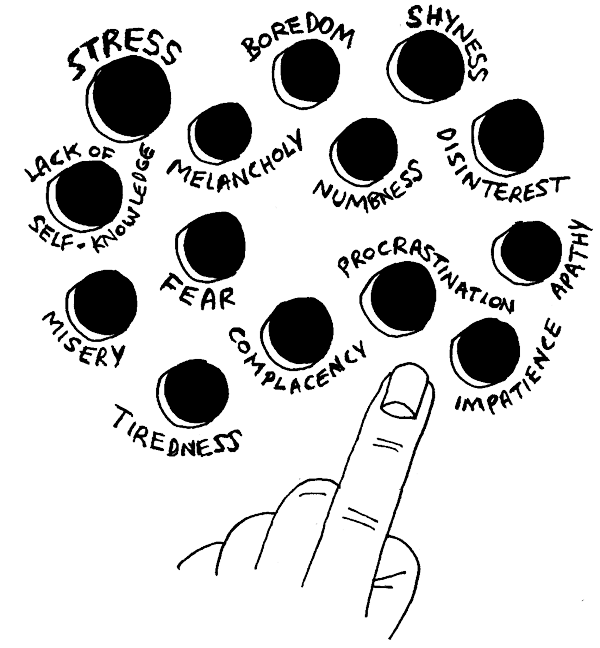
From this angle, the story of drugs already looks a little different. Indeed, this Consciousness Remote Control looks less like a snazzy tool-kit for all kinds of positively-tweaked experiences and other casual wizardry, but more like something designed by the Massively Depressing Television Company.
Actually, looking at some of those fairly big and recurrent problems, drugs look a bit more like something else…
Medication
There’s two main ideas about drug addiction, which you can see in action watching the (conservative) journalist Peter Hitchens bicker with Chandler.
In summary: Peter thinks that addiction is a choice, and a not very good choice, and a not very good choice that the government should protect us from with its friendly police-type people. Chandler thinks it is not a choice, at all, but a medical condition, and as such the government should protect us from it with its friendly doctor-type people.
The debate is politically charged, for two reasons: Firstly, the Addiction-as-Not-a-Very-Good-Choice model fits more with ideologies on the right of the political spectrum, with its emphasis on personal freedom, and therefore personal responsibility, and less with the left, with its emphasis on trying to design into society systems that account for the world’s inherent unfairness, and, therefore, collective responsibility for its problems, ‘addiction’ being one of them. Secondly, if the Addiction-as-Disease model is right, that’s a bit awkward, given the rather embarrassing little fact that for a hundred years we’ve been shepherding hundreds of millions of people into prison to punish them for being so unhelpfully unfortunate. Oh.
On top of that, not only could people like Peter Hitchens no longer feel quite as delighted with themselves for being Very-Good-Choice People, but suddenly The War on Drugs would seem a lot more like an expensive global witch-hunt for the mentally ill. This would be, to say the least, embarrassing. Meanwhile, we’ve made drugs (which people wanted/needed) harder to get, therefore more profitable (criminals are famed for understanding supply and demand), and our world spectacularly less pleasant (criminals are less famed for their responsible business practices.)
Well, in this instance, I’m with Chandler and friends.
Is addiction a disease? These fairly big-hitters think so:
- The American Medical Association
- The World Health Organisation
- The UK Drug Policy Reform All-Party Group
- The American Bar Association (ironic), Psychiatric Association, Hospital Association, Public Health Association, and College of Physicians
- The National Institute on Alcohol Abuse and Alcoholism and National Center on Addiction and Substance Abuse (US)
(There is still some controversy about labelling addiction as a full-on ‘disease’ alongside more obvious body malfunctions like rickets, leprosy and scurvy, which no amount of ‘will-power’ could overcome. While, in general, the definition holds in the sense that we know problematic, physical changes have occurred in an addict’s brain – changes which can be undone, but slowly – some doctors are reluctant to define personal responsibility completely out of the equation, wanting to avoid self-fulfilling ‘victim mentality,’ or transfering all responsibility away from Chandler when it hasn’t been his day, his week, his month, or even his year.)
Regarding governments’ acknowledgement of the well-prescribed medical consensus, however, I think most states are still acting like toddlers with chocolate all over their mouths. Mummy Scientist and Daddy Doctor are asking politely what’s going on, yet politicians keep claiming over and over again that the entire cake is gone because it was stolen by a dinosaur.
Just Say No
No. A hundred years of ‘Drugs are Evil‘ and ‘Just Say No!’ and Idiots have muddied our understanding of drugs, I think, to the point where we don’t understand what is happening to people who become addicted to them, so we don’t sympathise with them easily, so we don’t really want to (or know how to) help them. It seems to me that most of the world’s current drug policy is this:
1.) Addicts are shit.
2.) We don’t want addicts.
3.) Drugs create addicts, so no one should take drugs.
In other words, we’ve assumed that something inherent to the pharmacology of the chemical is hacking otherwise sensible folk that could be behaving themselves and paying taxes. By this theory, if you take heroin for a week, that chemical will set its grubby claws into your squeaky-clean brain, creating a new ‘equilibrium’ that only more drugs can maintain. Heroin has climbed into the driving seat, and now it, instead of you, is in control of the vehicle. You’re an addict now, kid. (Please proceed to prison, you naughty little drug person.)
But this idea has been so thoroughly murdered in medical, scientific and academic circles that whenever we see a journalist or politician trying to give it CPR in public, we should regard them with the same level of worry as a figure skater shouting, “The world is the shape of a pickle! The Jews did 9/11!”
It is little more than an unfriendly relic of Victorian daftness, unhelpfully enshrined in our legislature, from a generally more silly time when we had a lot less scientific understanding of the body, brain, and everything.
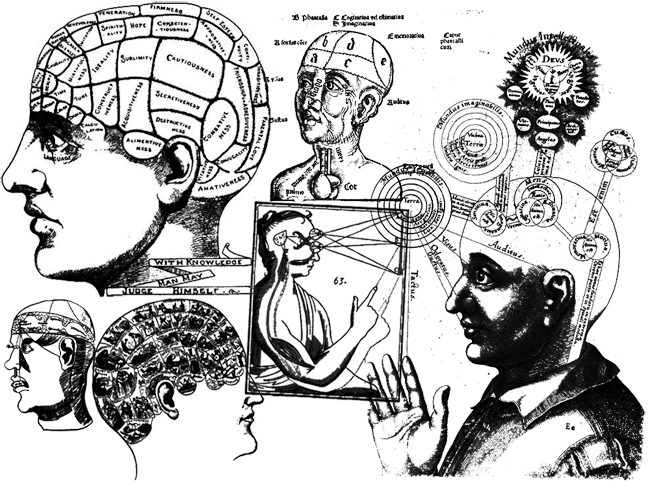
It was basically guesswork
Knowing nothing about the inside of the brain or how it works, we had to pin a wild stab-in-the-dark Theory of Addiction on weak character, moral failure, and general tomfoolery of the Pete Doherty variety.
Aw, so nice that you care. Pete’s doing better, thanks. While researching this article, I learned that he’s out and about, thanks to an Abstinence-based recovery program. Here’s a quote from the man, more famous for stumbling around near bins, looking like a schoolboy that just lost a fight with a quarry: “I suppose there’s a difference to being attracted to trinkets, rituals, and the idea of spirituality—which I think I am—and actually being engaged on a daily level with amending spirit faults when for me it’s been hard giving up everything else. There’s an element of mindfulness, which I believe is taken from the Buddhist culture. I don’t like to say it, but fuck it I will: it’s just the essence of Being really. And not getting on the train—not going with the negative thoughts.” Fine.
This fundamental confusion has led to a misdiagnosis of what society’s actual ‘problem’ is:
We’ve said: Drugs are addictive. Otherwise people are, or would be, fine. So, let’s fight the drugs (maybe even have a nice, expensive, world-wide War on Them.)
We should have said, though: People get addicted. Drugs are a thing that people that get addicted get addicted to. How do we fight addiction? Oh look it’s a massive pain in the arse project that involves reformatting a lot of society, one addict at a time. Annoying.
Just as an addict’s first step to recovery is to admit they have a problem, so too can society only recover when it looks in the mirror, and recognises the unpleasant things it has done to itself.
Life’s Lottery
We do not have to visit a madhouse to find disordered minds; our planet is the mental institution of the universe.― Johann Wolfgang von Goethe
Addiction is easiest to understand when you realise that every person has some problems, some neuroses, and some damage, lightly-hidden behind their eyes. We are all a bit broken, bless us. We just can’t easily see the health issues in each other’s heads.
Indeed, it seems basically impossible, or exceedingly rare, for someone to be thrown into the world, swim through a family, a school, a culture, and a puberty of infinite possibility for cruelty, then emerge as an adult totally dry on the other side. Nuh-uh. The odds are stacked extraordinarily against any of us coming out of something as insane as a childhood as a fully, totally ‘normal’ human being, completely well-adjusted in every respect to a very weird world (if such a thing were even possible.) Instead, we develop our odd little human problems, bundled up into a semi-functional personality.
However, let’s face it, we definitely don’t all get an equal share of the potential damage that’s getting doled out. Parenting is a game that has novices, rookies, pros, and people who probably shouldn’t even be allowed to play. Let’s briefly imagine a spectrum, with Joseph Fritzl and his wife-daughter-combo on one end, and Brad Pitt and Angelina Jolie on the other. You were born to parents somewhere on that parenting continuum. No one gets to choose their parents, their bodies, their gender, their sexuality, their DNA. It’s all the luck of the draw, life’s most significant and indifferent lottery, and we all only get the one hand we’ve been dealt.

Welcome to Earth, kid. Good luck.
It shouldn’t be surprising, then, that a quick glance at the wider world reveals that some people are really hogging more than their faire share of society’s problems. Addiction is easiest to understand when you make the simple connection that drugs just happen to be an instant, reliable, but temporary, answer to many of them.
If you’ve escaped with relatively ‘lesser’ problems – let’s say, you only feel 92.6% as funny as your funniest possible self until you’ve had two pints of beer – then the level of risk you’ll face in relation to alcoholism is massively lower than someone who was abused as a child, grew up with rubbish parents, or is regularly brain-bothered by some other brand of trauma, who finds (perhaps unknowingly) that alcohol offers some relief from the every day problems inherent to being sober. If alcohol is the same solution to both problems, it’s easy to see in which scenario it has a much more urgent purpose as a psychological crutch. If the baseline problem is always simmering in the background or reoccurring regularly, the allure of the Remote Control will be strong.
If we imagined these two problems as purely medical problems – like the commonly-held medical classification suggests we could – we notice immediately that one of these hypothetical patients needs their medication more than the other. ‘Psychological pain,’ while it might sound like the kind of thing you could simple shout ‘man up!’ at as you drive past it in a van, is no trivial matter. Some fMRI research suggests that brains might well be registering ’emotional pain’ in similar ways and regions as ‘physical pain’ [1]. This shouldn’t actually surprise us: the need ‘to belong,’ for example, has the exact same evolutionary imperatives as the Darwinian drives for food, sex, and shelter. In-group tribal cohesion meant, for an evolutionary amount of time, survival. It makes sense, then, that a failure to meet this ‘need’ could make our bodies ‘feel’ as physically uncomfortable as hunger does. Rejection, loneliness, social ostracism, or lack of meaningful connection to ‘our tribe’ hurt. We are ‘hungry’ for ‘a reward’ that a hundred million years of natural selection have hard-coded us to be hungry for.
The alcoholic is suffering, and some clumsy brand of cheap relief is available to him or her at every tavern in town.
From a medical point of view, drugs, alcohol and any other escapist compulsions generally remain pretty un-ideal forms of self-help for psychological problems, since they are treating symptoms, not preventing them. To psychologists, they’re numbing the pain of the toothache, but ignoring the rotten tooth. Our alcoholic treats the pain, but then the anaesthetic wears off, to be replaced by a hangover. As the same-old problems come back, so must the solution – the alcoholic re-doses. Click, click, click. The actual character of their sober life is the problem they are trying to solve — and so the alcohol will remain a necessary crutch unless/until that life somehow improves. If our hapless self-medicating drunk accidentally stumbled in to a therapist’s office or a healthy relationship or a more rewarding job or a yoga class or a dojo instead of the pub, pub, pub, it’s not hard to imagine that some competing desires might start – at last – to win out.
In the meantime, though, for the lowly price of five bucks a hit, one can fix him or herself for the night.
I have a friend who gets really strong period pains, which she’d be delighted to know I’m writing about on the internet. Once a month, she faces the following choice, which she has and might well face for a total of 30 boring menstrual woman years: she either loses 3-5 days per month – workdays, weekends, her period doesn’t bloody care – to mood-destroying, leg-bothering and generally day-ruining crampy bullshit; or, alternatively, she can find the strongest dose of a drug (Ibuprofen) that she can legally get her hands on, push that button like she’s popping Tic-Tacs, and get on with the good life without her daft womb deciding now must be horrible lonely sofa week.
Now, imagine I, as either a person with a more reasonable womb or a non-womb-owning member of the same species, told her this: “You take drugs too much! You’re just masking the pain! You should listen to your body. Don’t cover it up; go through it, feel all of it, it’s trying to tell you something for a reason, man. Don’t you know that Ibuprofen is bad for your kidneys?”
“Um, shut up,” I think, would be a perfectly reasonable response.
I share with you my friend’s period drama (ho ho ho), only because I think in her situation those shitty days are absolutely unnecessary. They are pointless, meaningless, and, in a modern world where God is Dead but 800mg Ibuprofen mega-tablets are alive and kicking, avoidable suffering (you might argue that their ‘purpose’ is to prepare her body for childbirth, you contrarian you, but this level of pain can’t be necessary, otherwise all women would suffer similarly. My friend’s body, in particular, is not a team-player.) The kidney argument might be valid, but it certainly looks like a proportionate risk/reward trade-off, given the overriding pain-in-the-thighs bullshit she would otherwise have to endure because of some random, annoying, unfairly inherited expression of her particular biology.
If you can understand why someone would Press the Pain-killer Button to alleviate the Period Pain Problem (or any other recurring physical ailment), then why not also for the emotional pain of the brain? This is the more compassionate view of drugs we could foster: sure, it’s better not to need medicine… but if someone does need it, who are we to take it from them?

Part II: How Not to Become a Drug Addict >>







